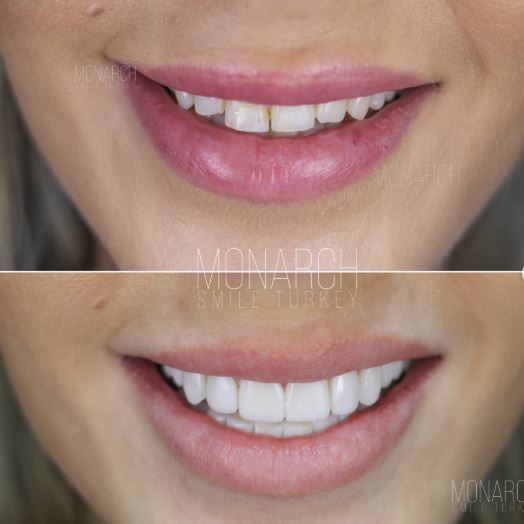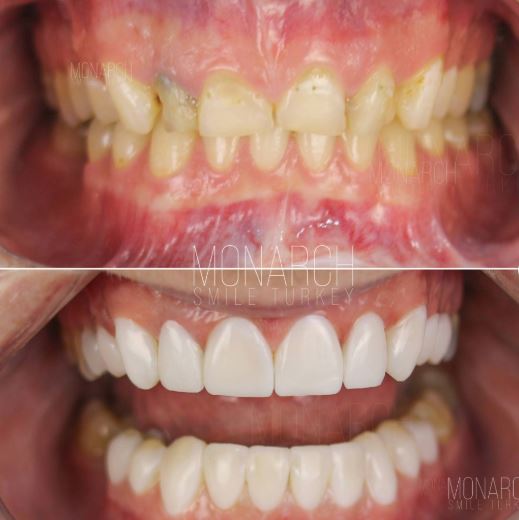Composite bonding is one of the fastest, non-invasive, and most affordable procedures in dental veneer treatment. Especially in recent times, its popularity has increased due to its low cost and results. When you want to fix your smile without damaging your teeth, have a look at composite bonding's pros and cons. We use composite fillings as an alternative to amalgam fillings.

We use composite fillings to fill the gaps in the back teeth. Cosmetically repairing front teeth with composite resins, the same material as composite fillings.
We apply composite bonding to correct deformations and cracks in the front teeth, close gaps, and cover minor defects such as crooked teeth. You should consult your dentist to determine if this treatment is right for you. However, we have explained some of the advantages and disadvantages of composite bonding below to help you make an informed decision before visiting the dentist.
Advantages of composite bonding
Quick and Efficient
When the aesthetic appearance of your teeth is at the forefront, composite bonding is both fast and effective. You usually visit the dentist only once, and although this time depends on the number of teeth you will have composite bonding, the process is usually completed in one to two hours.
In composite treatment, your natural teeth and tooth enamel are generally not damaged. There is no need to cut and drill your teeth in order not to damage your teeth in any way.
Multipurpose use
Composite bonding is a versatile method of repairing minor imperfections. We recommend composite bonding treatment if you have any of the following problems: chips or cracks, gaps between teeth, discolouration, crookedness, misalignment, decay and trauma.
Natural appearance

With composite bonding, you can regain the natural shine and health of your teeth. Composite resins in various tooth shades are used to give the appearance of your real enamel.
Procedure is painless
Composite bonding treatments usually do not require drilling or anaesthesia. After the treatment, you can continue your normal activities without feeling any pain.
Cost effective
Compared to other dental crown treatments, composite bonding treatment is much more economical. The results obtained as a result of the treatment are also very satisfactory. Composite bonding is completed in one session if there is no need for additional treatment. Therefore, it is one of the most suitable treatments in terms of cost-effectiveness.
Durability
Composite bonding has been shown to last between 3 and 5 years with proper care. However, because it is not as strong as real teeth, composite resin can break and become stained by things like coffee and red wine. However, it is easy to replace and rebuild.

Briefly, pros of composite bonding: prompt outcomes, an easy process, is minimally invasive, maintains the integrity of teeth, has a natural look, is affordable, has many possible uses, most situations do not require anesthetic, is simple to fix, strengthens teeth, is durable and resistant to stains, and reduces tooth enamel loss in comparison to veneers.
Disadvantages of composite bonding
Requires expertise
Composite bonding may seem like a simple and easy treatment, but it should be performed by a qualified and skilled dentist. If you want to achieve both natural-looking and aesthetically acceptable results, it is imperative that you find a dentist who is skilled and experienced in cosmetic bonding.
Not as long-lasting as a dental veneer
Composite resin has a decent lifespan, but its durability is not as good as that of a denture veneer and it cannot resist high pressure and will crumble or crack. They do not last as long as dental veneers or crowns. It is significantly easier and cheaper to repair cracks or chips, but they are not as durable.
Not strong stain resistant
Composite resins absorb moisture over time and start to develop stains. Drinks and foods containing pigments such as coffee, tea and red wine can also discolor them if consumed frequently. Smoking also causes discoloration of the resin used in composites.
Briefly, cons of composite bonding: prone to discoloration, not as long-lasting as dental venners, easily damaged by chips or cracks, decreased durability and requires regular maintenance.
At Monarch Smile Turkey, we take satisfaction in achieving outcomes that go beyond expectations, even in the most difficult instances of composite bonding.
For more detailed information, please contact us or visit us at our dental clinic.
